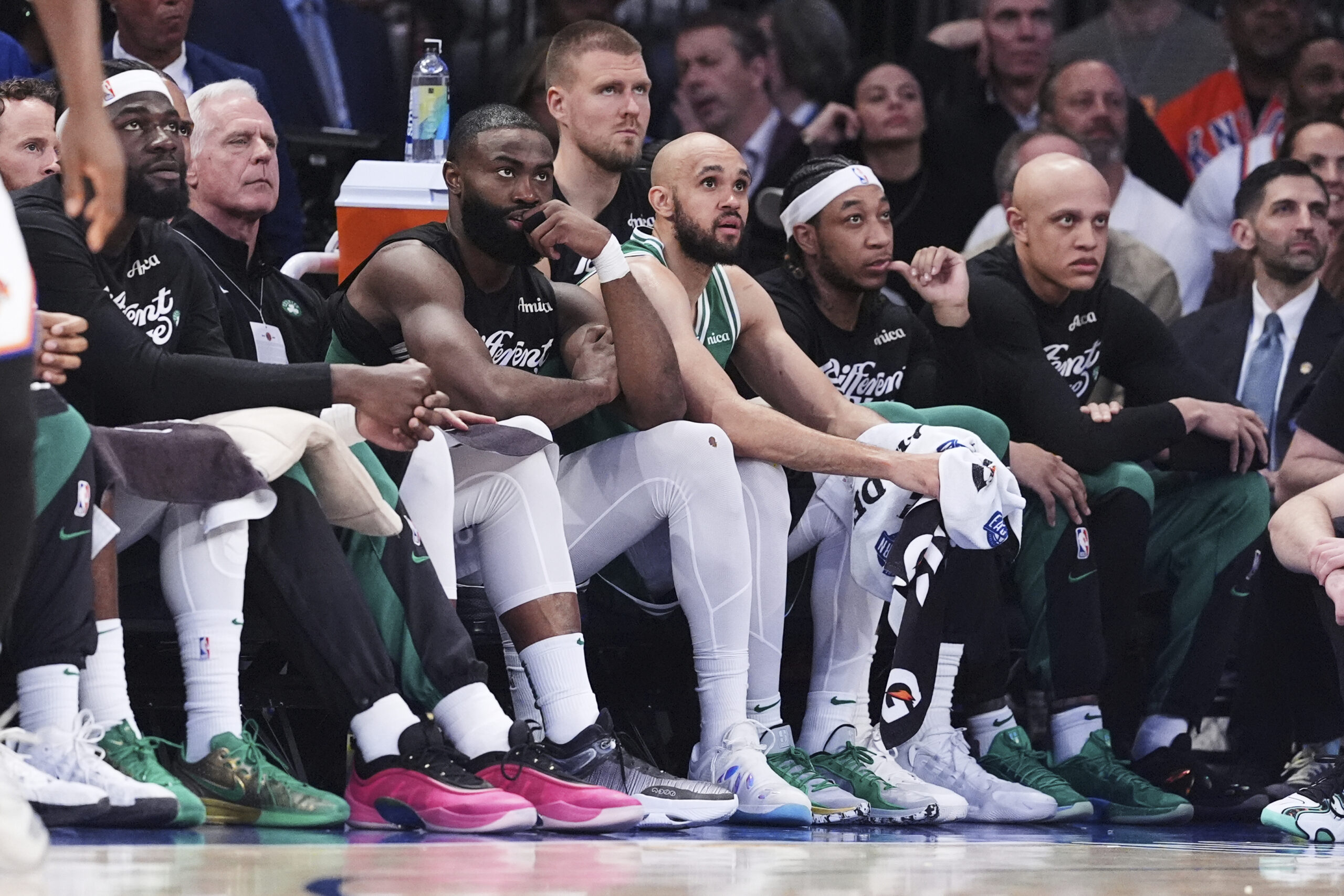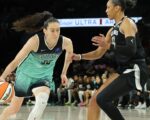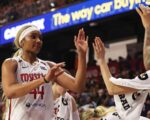Nineteen defending champions won as many games as the Boston Celtics did in this regular season. A dozen of them won another title. The Celtics could not. Not with the 3-1 hole they dug themselves in during their second-round playoff series against the New York Knicks and not without an injured Jayson Tatum.
The Celtics won Wednesday’s Game 5 at home as a resilient bunch in the wake of Tatum’s ruptured right Achilles tendon. The All-NBA forward suffered that injury at the end of Game 4, as Boston fell into its 3-1 hole. They did not have another rallying effort in them in New York on Friday, dropping Game 6, 119-81.
Tatum’s co-star on the Celtics, Jaylen Brown, fouled out in the third quarter. He was the only one for Boston who could make a basket. The rest of the Celtics shot a combined 35%. It was as ugly as ugly gets.
It marks the end of the series and the season for these defending champions. The Celtics bordered on great for much of the season, serving among the three betting favorites at BetMGM to win this year’s title. But they suffered the same fate as the league’s previous five defending champions, losing in the second round.
This series was disastrous for the NBA’s winningest franchise. The Celtics blew back-to-back 20-point, second-half leads at home to the Knicks in Games 1 and 2. They won Game 3 in New York, only to blow a 14-point, second-half lead in Game 4. That loss was compounded by Tatum’s injury, which could cost him the entirety of next season, as the effects of his absence already ripple throughout the organization.
In the days following that devastating news, the Celtics expended what was left of their emotional energy in Game 5. They had nothing left for Game 6, folding under the weight of offseason unease.
The Celtics owe more than $250 million in salary to a dozen players next season, according to Spotrac, and almost as much in luxury taxes. A new team owner, Bill Chisholm, is on the hook for that price tag. There was some thought that maybe Chisholm would foot the bill if it meant chasing a three-peat. No longer is that a possibility. Tatum’s injury likely means a championship is off the table next season, too.
Would you want to lose money on a roster that cannot win a title? Not if you do not have to. Chisholm presumably purchased the team to raise banners and make money, and if he cannot do the former, he is probably going to do the latter.
To get under the projected luxury-tax line ($187.9 million) — and therefore avoid the repeater’s tax — would mean a massive overhaul, considering Tatum and Brown are owed a combined $107.3 million next season. Even getting under the first ($195.9 million) or second apron ($207.8 million) will take work.
It could mean free-agent big men Al Horford and Luke Kornet are no longer Celtics. It could mean Sam Hauser’s four-year, $45 million extension is traded. Or it could mean some of their bigger deals are on the move. Every dollar out the door could be as much as five times that in savings. That is how the tax works.
Jrue Holiday is owed $104 million over the next three seasons. He will be 37 years old at the end of that contract. In the wings is Payton Pritchard, the reigning Sixth Man of the Year, who just finished his first season on a four-year, $30 million deal. He is among the best values in the NBA. It would not take much to convince Chisholm the Celtics can replace most of Holiday’s production at a fraction of the cost.
Likewise, Kristaps Porziņģis is slated to begin next season on a $30.7 million expiring contract. Injuries and illness have largely prevented him from contributing to Boston’s last two postseason runs, including the championship. Assuming further risk for a team that cannot win it all feels like a fool’s errand. Trade Porziņģis for a better bargain — or a non-guaranteed contract that can be wiped from the books entirely.
These are not moves that will make the Celtics a better team next season, and that is not something the fan base will want to hear. These transactions would be designed to increase Boston’s financial flexibility to reconstruct a contender for when Tatum returns healthy in 2026-27. Tatum’s injury is an excuse for what was likely going to happen anyway, as long as the Celtics did not repeat: Costs were going to be cut.
In the meantime, the Celtics will be led by Brown, a four-time All-Star. They have Derrick White, whose four-year, $118 million extension, believe it or not, is another bargain. And Pritchard. They seem like the most likely candidates to stay, given contracts, ages and the ability to bridge this one-year gap for Tatum. Who joins them on the other side is anyone’s guess. Who joins them in the meantime is also a mystery.
A team with Brown at the helm, with White and Pritchard at the guard spots, and with whomever they might retrieve in return for Holiday and/or Porziņģis (or whomever is on the move), will be expected to make some noise in a watered-down Eastern Conference. Not championship noise but some noise. That will lead to speculation about Tatum’s status for next year’s playoffs, which will most likely be just noise, too.
Which of the Celtics will be next season’s team in the absence of Tatum, the resilient group we saw in Game 5 or the lost bunch from Game 6? The answer is probably a bit of both. Inconsistency is the mark of a superstar-less team, which is what the Celtics are for the foreseeable future. Barring a miracle, it is about bridging the gap to the 2026-27 season now, lowering costs and reconstructing a contender ASAP.
Who knows if Brad Stevens can pull it off? Who knows what Tatum’s game will look like if and when he does? If this all sounds cold, it is because it is. The NBA’s collective bargaining agreement, for whatever reason, was designed to dismantle budding dynasties. Title windows are shorter than ever — shorter still when a team loses one of the four best basketball players alive for an indeterminate amount of time.


